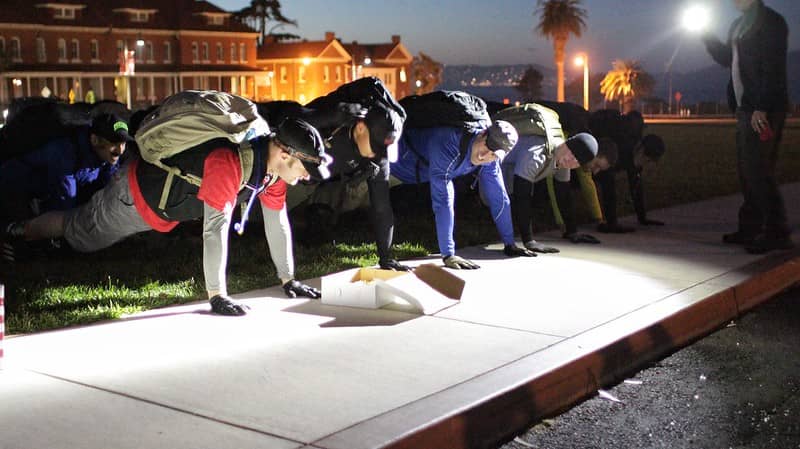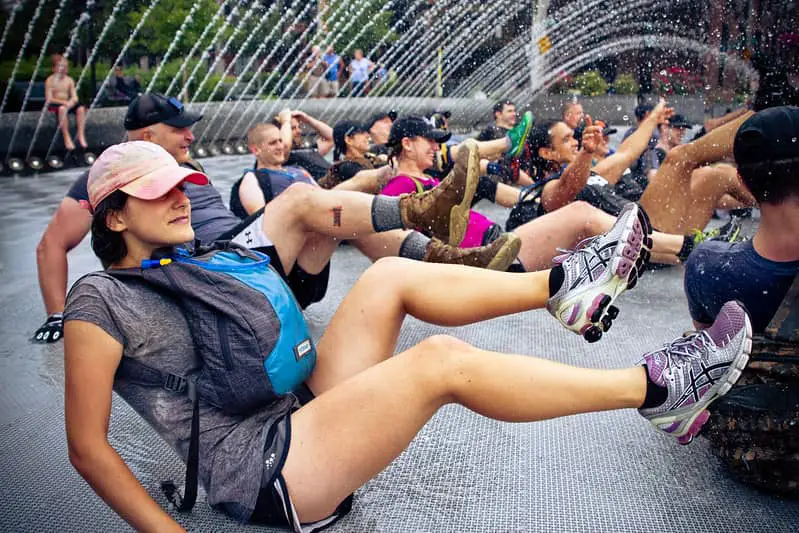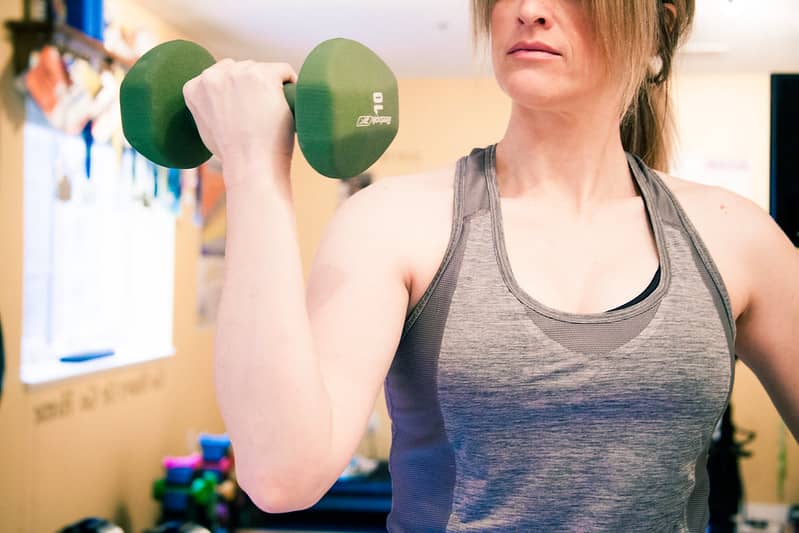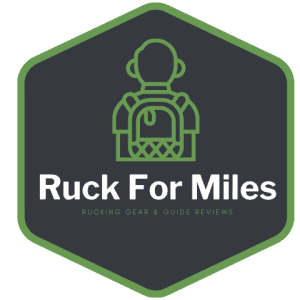
In order to lose weight and fat through rucking, you need to focus on your diet, sticking with a rucking workout program, getting enough sleep, and tracking your performance.
Rucking for weight loss and rucking for fat loss are used interchangeably, yet there is a huge difference between both statements. If you’re rucking to lose weight, what YOU ARE REALLY SAYING is that you are rucking to lose overall body weight.
Losing overall bodyweight includes losing water, muscle, and fat.
In this post, we will address the following:
- Rucking For Weight Loss Vs Fat Loss
- Diet When Rucking For Weight & Fat Loss
- Rucking Workout For Weight Loss and Fat Loss
- Rucking Workout For Body Recomposition
- Proper Sleep For Rucking Weight & Fat Loss
- Tracking Rucking Performance To Losing Weight & Fat
- How Does Rucking Help You Lose Weight & Fat
Rucking For Weight Loss vs Fat Loss
Fat loss, on the other hand is loss of weight as a result of losing fat, making it a healthier and more specific weight loss goal.
With all that said, there is a third option. Body recomposition. An option that not is not talked about frequently.
Body recomposition is a weight loss approach that focuses on not only losing fat, but gaining muscle at the same time (source).
It’s important to note that everyone has different goals in their fitness journey. Whether your goal is to ruck for weight loss, fat loss, or body composition; all options are valid.
Remember, regardless of your objective of fat loss or weight loss, consistency is key. Here’s a complete guide on why rucking is so hard and what you can do to make it easier to ensure results.
Diet When Rucking For Weight & Fat Loss
Rucking can help you torch calories and help you lose weight.
In fact, if a 5 foot 8 Inches woman weighing 150 lbs who has a moderately active lifestyle rucked for 1 hour carrying around 20 – 40 lbs, she can lose up to 580 calories.
Not bad for just carrying a weighted backpack and walking for an hour!
Here’s where the bad news kicks in though, if this same woman (let’s call her Emily) burns a total of 2000 calories that day, but proceeds to eat 3,000 calories, she will be in a caloric surplus meaning she will not lose weight or fat.
Actually, if she keeps doing that she will gain fat and weight.
So what’s the purpose of bringing up Emily’s wicked day? Well, the point here is that even though someone can ruck for an hour and burn 580 calories from a single workout, they will not lose weight or fat without proper nutrition.
In order to lose weight and fat from rucking, you need to be in a caloric deficit. This means your energy expenditure (calories burned) needs to be more than the calories you consume.
Use our rucking calorie calculator and find out how many calories you can potentially lose from rucking.
Disclaimer: Consult A Nutritionist First
We recommend that you consult a nutritionist to properly asses your dietary needs. There are blood tests out there such as Thyroid Hormone Assessments, Vitamin D Status, Cortisol or the Stress Hormone, and more that may impede your ability to lose weight regardless of you being in a caloric deficit (source).
Rucking Workout For Weight Loss and Fat Loss

The rucking workouts are the funnest part. If you’re a beginner to the world of rucking, we highly encourage you to follow some sort of program. It can be difficult to start losing weight from rucking without a plan to follow.
So how do you start rucking?
Here’s a summary of our beginners rucking workout plan:
| Rucks per Week | Distance | Duration | % of BW | |
| Week 1 (or Stage 1 if you want to repeat this week) | 2- 3 | 2.0 miles | 1 hour | 15% |
| Week 2 (or Stage 2 if you want to repeat this week) | 2 – 3 | 2.5 miles | 1 hour 30 mins | 15% – 20% |
| Week 3 (or Stage 3 if you want to repeat this week) | 2 -3 | 2.5 miles | 2 hours | 20% |
| Week 4 (or Stage 4 if you want to repeat this week) | 2 – 3 | 3.0 miles | 2 hours 20 mins | 20 – 25% |
| Week / Stage 5+ | 2 – 3 | 3.5 miles | 2 hours 20 mins | 20%-25% |
Learn more about how much weight to carry when rucking.
Rucking Workout For Body Recomposition
If you’re looking to ruck to both lose fat and gain muscle, then rucking for body recomposition is what you’re looking for.
In order to achieve that, we recommend that you ruck to mainly focus on losing fat and building muscle. This is achieved by supplementing body building workouts into your workout regimen.
Here’s how a typical week of someone who is using rucking for body recomposition looks like:
| Rucking Session | Weight Lifting Muscle Target | |
| Monday | 2 hours | No weight lifting |
| Tuesday | 1 hour | legs and core |
| Wednesday | 1 hour | Chest & Shoulders |
| Thursday | 1 hour 30 minutes | Back, Biceps, & Triceps |
| Friday | 3.5 miles | 2 hours 20 mins |
The example above is not tailored to anyone specifically but the goal is to help you visualize how a training schedule of someone who is rucking to lose fat and gain muscle would look like.
Tip: If you choose to ruck and lift weights on the same day or training session, we recommend that you start with which ever is your priority.
For example, if your priority is to gain muscle, then start with lifting weights followed by the ruck and vice versa. This is because you want to prioritize your glycogen or sugar levels on what you deem most important.
The reason why we recommend supplementing in weight lifting is because while rucking focuses on both strength and fat loss, lifting weights is a form of hypertrophy training.

Hypertrophy training solely focuses on increasing muscle size (source). This involves implementing higher repetitions to stimulate and increase muscle endurance and muscle volume (source).
A lot of different rucking events will have a workout session where they use their backpacks as weight and perform workouts such as squats, shoulder raises, and more. This is something you can supplement into your workout routine as well.
Strength training helps you achieve different goals. Learn more about rucking for strength training if that’s your goal.
Proper Sleep For Rucking Weight & Fat Loss
Good sleep gets you well rested, allowing you to kick start your morning fully energized and rejuvenated.
Not getting enough sleep is typically correlated with weight gain. This does not happen directly, but you essentially get yourself into a cycle that is hard to get out off.
If you’re not sleeping enough, then working out and sticking with a rucking workout program becomes much harder. Skipping on your rucking sessions starts to happen much more often which leads to inconsistency and impedes your ability to stick with a proper weight loss program.
A sleepy and tired brain does not make the best decisions. It fogs up the brain’s frontal lobe, the part of your brain responsible for decision making (source).
Tip: Try to aim for 7 – 9 hours of sleep everyday (source).
Check out our other rucking tips.
Tracking Rucking Performance To Losing Weight & Fat
Tracking your rucking performance helps you see your improvements. You can use different rucking apps to see how long your rucking sessions are and make note of the weight you carried.
We recommend tracking your performance because if you hit a plateau, you’d have a lot of data to look at and figure out what you can change to break through and continue to see improvements in your weight and fat loss journey.
It can also give you a boost in motivation when you look back at your first rucking days and see how far you’ve come along.
Check out our best apps for rucking.
How Does Rucking Help You Lose Weight & Fat
Rucking (which is LISS style training) improves your body’s ability to use fat as fuel instead of using glycogen stored in your muscles.
What is LISS? Low Intensity Interval Low-Intensity Steady State (LISS).
Rucking is a LISS style training because it is a low endurance workout that’s aimed to elevate your heart rate to 50 – 65% of your max heart rate (source). So you should still be able to hold a conversation while rucking.
Rucking has a low barrier of entry which means it is easier to start rucking. Some people even argue that because it is so accessible, that it helps them stick with rucking workout programs for much longer compared to Crossfit or other High Intensity internal training workouts.
This is great because losing weight and fat is all about longevity!
Frequently Asked Questions
Yes. Rucking can help you lose weight. A 150 lbs woman can burn up to 580 calories. However, to lose weight and sustain it, you have to pay attention to diet and sleep.
